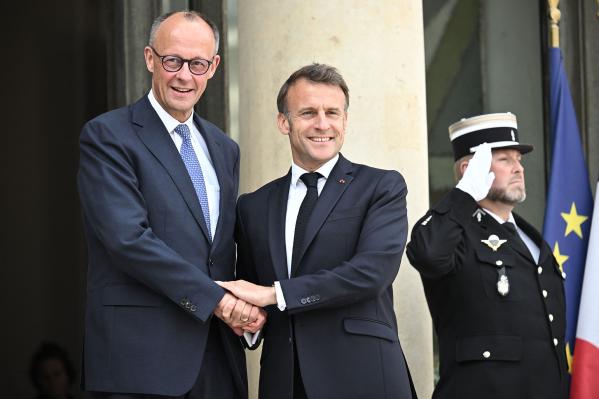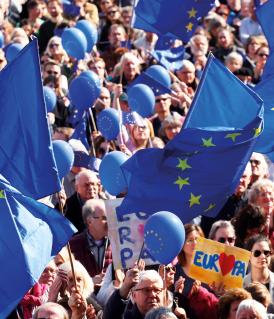Franco-German friendship – a driving force

How did the Franco-German friendship come about?
France is Germany’s most important partner in Europe. Parallel to European integration, after the Second World War both countries established a close partnership, which nowadays is often regarded as a model for reconciliation between two nations. In 1957, both countries were amongst the six founding members of the European Economic Community (EEC), the core of today’s EU. Franco-German friendship, sealed by the 1963 Elysée Treaty, is nurtured by close relations at the level of civil society and by numerous Franco-German institutions.
How are Germany and France deepening their partnership?
Signed in January 2019, the “Treaty of Aachen” follows on from the Élysée Treaty and realigns Franco-German relations for future challenges. Amongst other things, in it Germany and France agree to work closely to advance the European Union along with the other EU Member States, and to promote even further all those aspects of life shared by German and French citizens. For this reason, as of 2019 there has been, amongst other things, a Franco-German cross-border cooperation committee, and since 2020 a Franco-German citizens’ fund.
Furthermore, the partners intend to expand their collaboration in foreign, defence, security, and development policy Development policy German development policy as a constituent part of a global structural and peace policy endeavors to improve living conditions in partner countries. The Federal Government, in close collaboration with the international community, is committed to fighting poverty, to peace and democracy, to… Read more › , as well as their cooperation in the fields of education and research – for example through the mutual recognition of qualifications. The partners will also focus more closely on global issues such as climate protection and health.
How do the parliaments of Germany and France cooperate?
The parliaments of both countries likewise have close ties. As of 2019 the Franco-German Parliamentary Assembly convenes twice a year. It is made up of 50 members each of the German Bundestag and the French National Assembly. The body’s duties include monitoring implementation of the Treaty of Aachen, further rapprochement in terms of German and French parliamentary work, and the elimination of obstacles to a Franco-German economic area.
Germany and France are each other’s most important trading partner in Europe. Airbus, the aerospace corporation, is a symbol of the success of the close cooperation between Germany and France.
What form of social and cultural exchange do Germany and France cultivate?
Among others, the Franco-German Youth Office (FGYO) shapes exchanges between the two countries at the civil society level. It was founded on the back of the 1963 Elysée Treaty. Since then, almost ten million children and youngsters from both countries have participated in exchange programs and other FGYO activities. A dense network of twinning agreements also enables encounters between people from both countries.
The German and French cultural institutes abroad also work closely together; indeed, this can even lead to individual cultural institutes being integrated under a single roof. Since its foundation in 1991, the joint TV station arte has been an outstanding example of media collaboration in the two countries.


